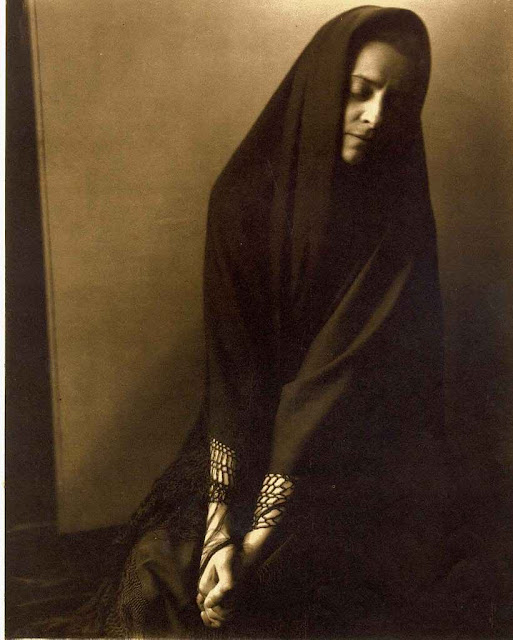Edward Steichen (1879-1973) is unquestionably one of the most prolific, versatile and influential photographers in history. Steichen casts a long shadow in 20th-century photography. He was admired by many for his achievements as a fine art photographer, but he also experimented and excelled in every other genre of photography. Even his most commercial work shows more aesthetic consideration than product placement. Portraiture, the nude, fashion, landscape, cityscape, dance, theatre, war, advertising, still life and flower photography – no genre of photography, it seems, went unexplored by this innovative image maker. Graphic design, typography, and art direction – these areas too, proved fertile grounds for Steichen’s creativity.
Steichen was also famous because of his outstanding curatorial efforts, most notable his widely acclaimed exhibition The Family Man, which began touring internationally in 1955 and attracted well over nine million visitors worldwide and sold two and a half million copies of a companion book. He was the most frequently featured photographer in Alfred Stieglitz' groundbreaking magazine Camera Work during its run from 1903 to 1917. Steichen later became a photographer for the Condé Nast magazines Vogue and Vanity Fair from 1923–1938 and concurrently worked for many advertising agencies including J. Walter Thompson. During these years Steichen was regarded as the best known and highest paid photographer in the world. Steichen being the overachiever he was also directed the war documentary The Fighting Lady, which won the 1945 Academy Award for Best Documentary. After World War II he was Director of the Department of Photography at New York's Museum of Modern Art until 1962.
Critics and curators place Steichen as one of the most influential and controversial artists of his time, and he has been called the Leonardo da Vinci of photography.
"Photography records the gamut of feelings written on the human face, the beauty of the earth and skies that man has inherited, and the wealth and confusion man has created. It is a major force in explaining man to man."
Edward Steichen
Edward Steichen
Steichen self-portrait in studio, New York, 1929
Steichen at the beach, Hollywood, 1931
*click on images for larger view
Actress Gloria Swanson, 1924
The Flatiron Building, NYC, 1905
Steichen added color to the platinum print that forms the foundation of this photograph by using layers of pigment suspended in a light-sensitive solution of gum arabic and potassium bichromate. Together with two variant prints in other colours, also in the Museum's collection,The Flatiron is the quintessential chromatic study of twilight
Actor Gary Cooper, 1930
Actress Greta Garbo
Cary Grant
Charlie Chaplin
Princess Yusupov, 1924
Princess Irina Alexandrovna Yusupov (1895–1970) was the daughter of Grand Duchess Xenia Alexandrovna and the niece of Emperor Nicholas II. In 1914, she married Prince Felix Yusupov, best remembered as the murderer of Rasputin, the controversial monk whose association with the Russian imperial family discredited the monarchy in its last years
Actress Pola Negri, 1925
Wind Fire: Therese Duncan on the Acropolis, 1921
The renowned ballroom dancing team Antonio de Marco and Renée de Marco, 1935
Princess Nathalie Paley, 1934
Actress Joan Crawford, 1932
Actor Paul Robeson as "Emperor Jones", 1933
Photographer Alfred Stieglitz at Studio 291, 1915
Sculptor Rodin with his masterpiece The Thinker, 1902
When Steichen arrived in Paris in 1900, the Rodin Pavilion outside the Exposition Universelle was his first stop, and he saw not only the master's work but the master himself—"a stocky man with a massive head . . . and I made up my mind I was going to photograph him someday." Only after visiting the revered sculptor's studio, nearly every Saturday for a year, did Steichen finally dare to photograph him. Steichen described Rodin's studio as being so crowded with marble blocks and works in clay, plaster, and bronze that he had to compose his portrait from two exposures, one of Rodin and theMonument to Victor Hugo and another of The Thinker. He first printed each image separately and, having mastered the difficulties of combining the two negatives, joined them together in a single picture. The result is among the most ambitious efforts of any Pictorialist photographer to emulate art in the grand tradition. Suppressing the texture of the marble and bronze and thus emphasizing the presence of the sculptures as living entities, Steichen was able to assimilate the artist into the heroic world of his creations. Posed in relief against his work, Rodin seems to contemplate his own alter ego inThe Thinker, while the luminous figure of Victor Hugo suggests poetic inspiration as the source of his creativity.
Brancusi's Studio, ca. 1920
Drizzle On Fortieth Street, New York, 1925
Nude study, 1901
Steichen visited Rodin for the first time in 1900. He brought a portfolio of his photographs with him and, after looking through the portfolio, Rodin allowed the American to photograph him in his studio. The results have been justly termed "among the best ever made." In this exquisite autochrome, an early type of color transparency, signed and dated 1907, Steichen recorded the aging sculptor clothed in timeless drapery and sitting at the feet of the plaster model of hisEve, a soft-focus image that appears almost as the sculptor's dream.
(via MoMA)Cmdr Edward Steichen photographed above the deck of the aircraft carrier USS Lexington, 1943
"Pilots pleased over their victory during the Marshall Islands attack, grin across the tail of an F6F Hellcat on board the USS LEXINGTON, after shooting down 17 out of 20 Japanese planes heading for Tarawa." Comdr. Edward Steichen, November 1943
Edward J. Steichen by Howard Sochurek, 1959


















































For years I've admired his work, especially during the war; now that you have provided this eye-opening 'lesson', his work will be more personal. Thank-you!
ReplyDeleteGreg Bishop
thank you for sharing this.
ReplyDeleteJust fell in love with Edward J. Steichen. Appreciate your effort. Cheers.
ReplyDeleteMany thanks for visiting my blog.
DeleteCheers!
Anthony